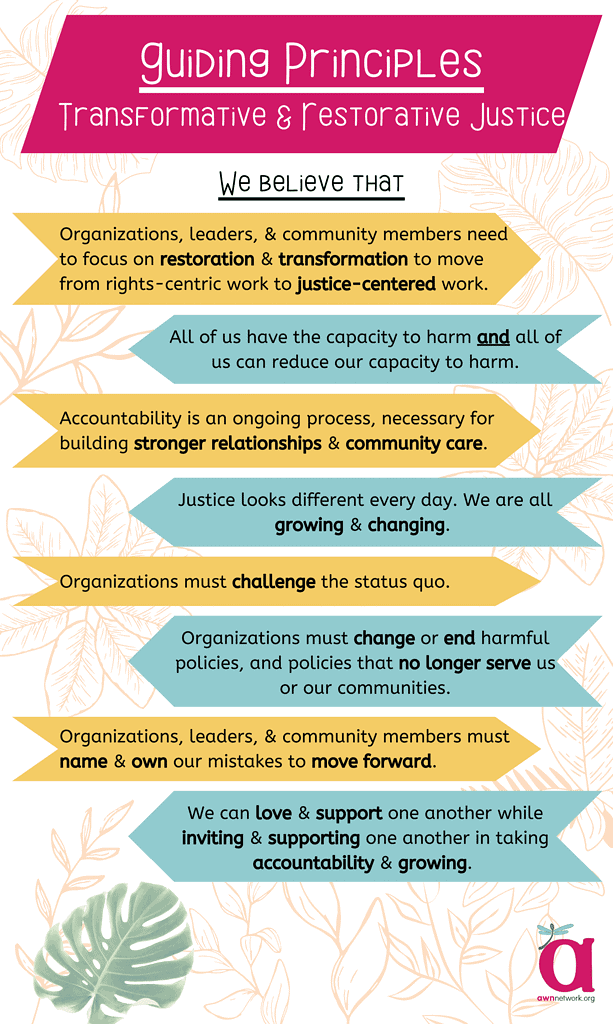Guiding Principles
Incorporating Transformative & Restorative Justice into Our Work
AWN created these guiding principles in collaboration with Mia Mingus.

AWN believes that our disability justice work is incomplete if we are not committed to transformative and restorative justice within our organization and in our communities.
Transformative and restorative justice are distinct frameworks that help inform our approach to harm, accountability, growth, and liberation. The restorative justice framework specifically focuses on restoring or repairing relationships after someone has caused harm or a rupture in the relationship. It emphasizes the importance of individual people and their direct community connections receiving support and working toward healing after harm. This may be described as making a person whole after they have been harmed.
The transformative justice framework focuses on responding effectively to the rupture or harm in a way that also transforms the conditions that created the rupture or harm in the first place, so that the rupture or harm does not happen again. The transformative justice framework recognizes that not all relationships can - or should - be repaired or restored. For example, we don’t want to restore social or cultural conditions to the status quo of white supremacy, capitalism, or other systems of domination and oppression. We also believe that even when people who have caused harm decide to take accountability and do self-work, this work does not obligate people who have been harmed to maintain, rebuild, or restart a relationship with the people who have harmed them.
Both of these frameworks involve community and collective work. This means building processes and skills to support people and groups who have been harmed, and building processes and skills to support people and groups who have harmed others. We believe that supporting people who have caused harm is a vital part of supporting survivors of violence, oppression, and other types of harm. In other words, our communities must work to support people who have caused harm to be able to take accountability, grow, and transform as part of our work to change societal and cultural conditions that enabled the harm. If we do not do this work, then we are not actually supporting survivors of harm.
AWN is an imperfect and growing organization, led by and supporting community members who are also imperfect and growing. To this end, we are committed to these principles of transformative and restorative justice in our work as a neurodiversity and disability justice organization:
Historically, the neurodiversity movement has been part of the global disability rights movement. AWN believes in and advocates for acceptance of neurodiversity and all neurodivergent people. We also believe in and advocate for disability justice, which is an intersectional movement that prioritizes disabled people of color, disabled queer and trans people, disabled poor people, and other disabled people at the margins within the disability community.
We believe that:
- Our organizations, leaders, and community members need to focus on restoration and transformation to move from work centered on rights to work centered on justice.
- All of us have the capacity to harm, and all of us have the opportunity to reduce our capacity to harm.
- Accountability is an ongoing process, and necessary for building stronger relationships and community care.
- Justice looks different every day. We are all growing and changing.
- Organizations must be willing to challenge the status quo.
- Organizations must be willing to change or end harmful policies - and policies that are not harmful, but that no longer serve us or our communities.
- Organizations, leaders, and community members must be able to name and own our mistakes in order to move forward.
- We can love and support one another while inviting and supporting one another in taking accountability and growing.
Through this work, AWN is committed to supporting other organizations in the disability rights and neurodiversity spaces that want to move from rights to justice.
Here, we have provided some additional resources on restorative justice, transformative justice, and disability justice. This is a starting point, and is not a comprehensive list of resources available to learn more. We also recommend the fantastic compilation of resources cataloged by the Bay Area Transformative Justice Collective, which includes audio recordings of every written piece.
Readings:
- “Pods and Pod Mapping Worksheet” by Mia Mingus, for the Bay Area Transformative Justice Collective
- “9 Ways to Be Accountable When You’ve Been Abusive” by Kai Cheng Thom on Everyday Feminism
- “The Four Parts of Accountability: How To Give A Genuine Apology” by Mia Mingus
- “Summary Statement Re: Community Accountability Process (March 2017)” from the BYP100 Project, an example of a community accountability process (content: discusses sexual assault)
- Beyond Survival: Strategies and Stories from the Transformative Justice Movement, edited by Leah Lakshmi Piepzna-Samarasinha and Ejeris Dixon
- Fumbling Towards Repair: A Workbook for Community Accountability Facilitators by Mariame Kaba and Shira Hassan
Videos:
- “Moving at the Speed of Trust: Disability Justice and Transformative Justice” with Leah Lakshmi Piepzna-Samarasinha and Elliott Fukui for the Barnard Center for Research on Women (two-hour video, with full transcript available)
- The Building Accountable Communities Project and the Barnard Center for Research on Women have also included these shorter video resources:
- “Intersections of Disability Justice and Transformative Justice” with Leah Lakshmi Piepzna-Samarasinha and Elliott Fukui (about 5 minutes)
- “What is Transformative Justice?” with adrienne maree brown, Mia Mingus, Stas Schmiedt, Ann Russo, Esteban Kelly, Martina Kartman, Priya Rai, and Shira Hassan (about 11 minutes)
- “What Does Justice Look Like for Survivors?” with Mimi Kim, Ann Russo, RJ Maccani, and Rachel Herzing (about 8 minutes)
- Centering the Needs of Survivors (Part 1) with Sonya Shah, Elliott Fukui, adrienne maree brown, Stas Schmiedt, Lea Roth, nuri nusrat, and RJ Maccani (about 8 minutes)
- Centering the Needs of Survivors (Part 2) with RJ Maccani, Priya Rai, Rachel Herzing, and Esteban Kelly (about 11 minutes)
Organizations/Projects:
